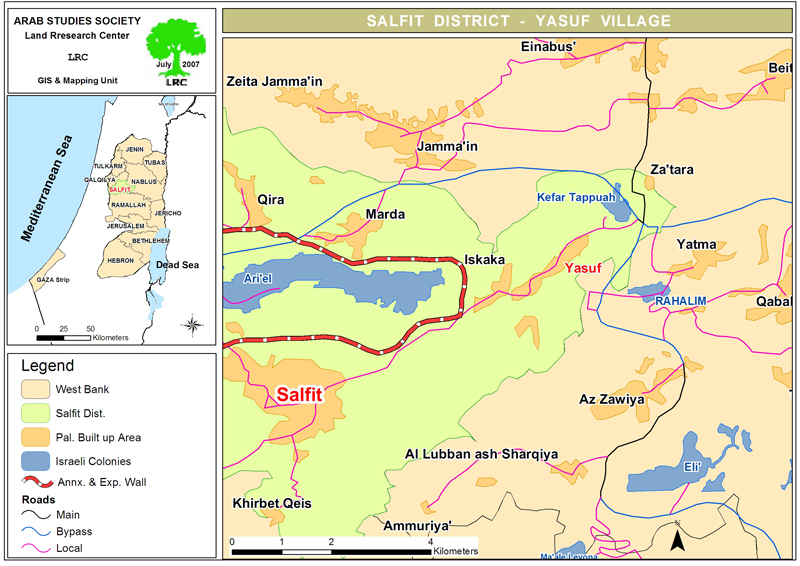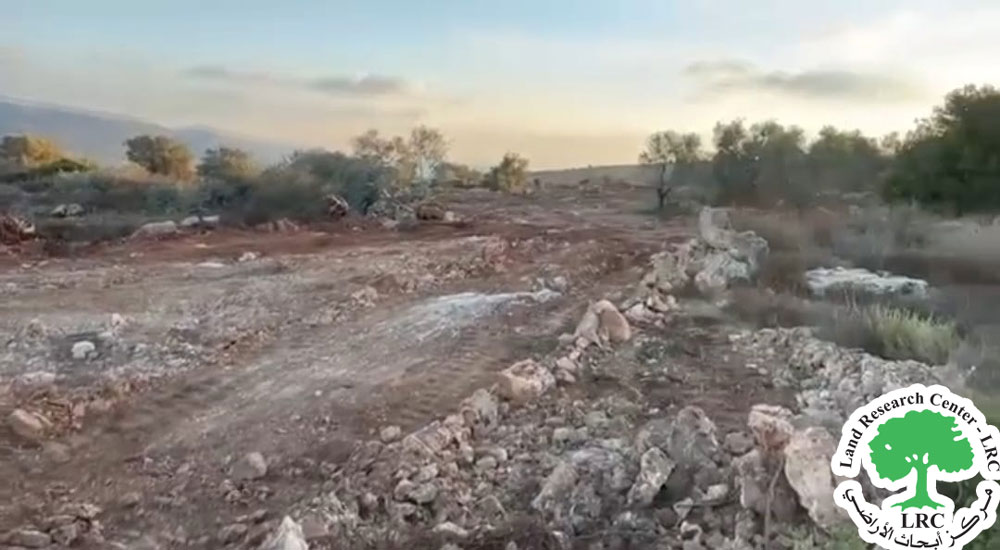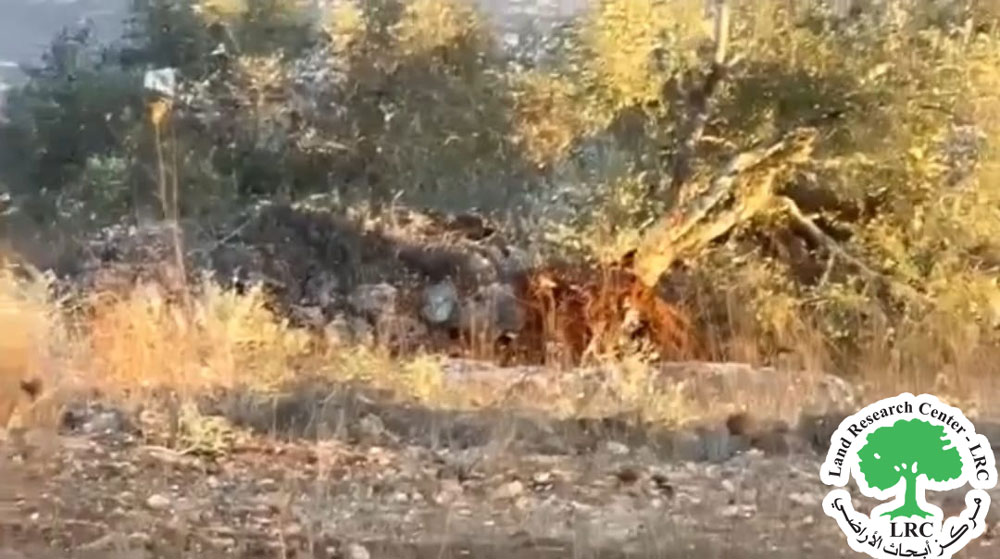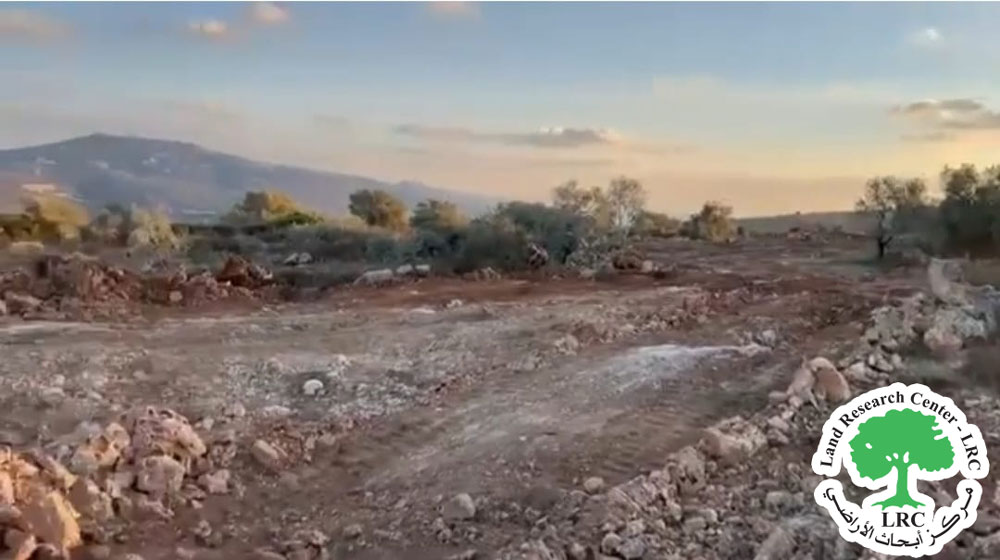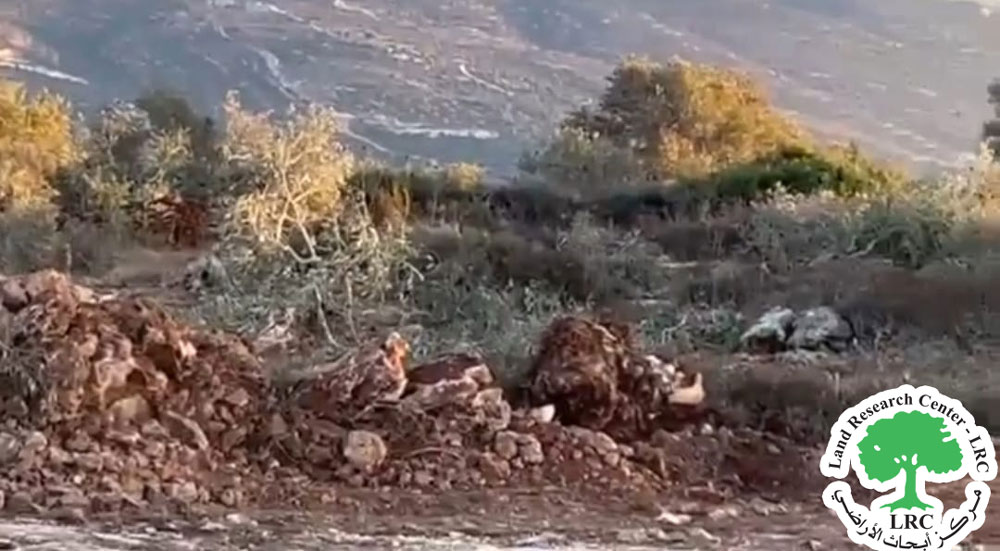In a blatant violation of the environment, settlers uprooted olive trees to construct a colonial road on the lands of Yasouf village in Salfit
Violation: Uprooting and uprooting 60 olive trees to construct a colonial road.
Location: Yasouf village, Salfit Governorate.
Date of violation: August 11, 2024.
Perpetrators: Outpost "Nofeh Nehemia."
Affected parties: Four families of farmers from the village, from the Al-Abed and Abdul Razzaq families.
Description:
On Sunday morning, August 11, 2024, settlers' machinery carried out land leveling works that targeted six dunams of land planted with olive trees in the "Al-Sarb" area, located between Yasouf and Askarra villages, east of Salfit. The machinery destroyed land located about 100 meters from the homes of Yasouf village.
It is worth noting that the purpose of the land leveling is to construct a new colonial road around the "Nofeh Nehemia" outpost to expand the settlement and seize more Palestinian land.
The leveling process has resulted in the complete destruction of at least 60 fruitful olive trees, each around 20 years old, as of the date this report was prepared.
The land that was leveled belongs to the following farmers:
Impacted Farmer | Target Land Area/dunum | Number of targeted Trees |
Abdullah Mustafa Al-Abed | 2 | 13 |
Ahmad Mustafa Al-Abed | 1 | 9 |
Zeyad Jamil Abdul-Razzaq | 1 | 11 |
Zuheir Jamil Abdul-Razzaq | 2 | 27 |
Total | 6 | 60 |
The affected farmer, Ahmed Abdel-Fattah Obeid, who is also the head of the Agricultural Committee in the village of Yasuf, stated to the researcher from LRC:
"What is happening in terms of the bulldozing of farmers' lands is part of the expansion of the 'Neve Nehemiah' settlement, which is built on the village's lands. This is a dangerous indicator, as all the lands surrounding that outpost are planted with olive trees and owned by several farmers from the village. Therefore, what is happening reflects the occupation's intention to prevent these farmers from accessing or even cultivating their lands, paving the way for their future confiscation."
It is worth noting that the colonial outpost “Neve Nehemiah” had its initial establishment in 2003 when an extremist group of settlers from the “Rehalim” settlement, built on the lands of the villages of Yetma and Yasuf, seized a plot of land claimed by the occupation to be “state land.” At that time, the settlers erected several tents in the area, and since then, there has been a noticeable increase in attacks on farmers in the region.
Subsequently, the situation escalated into the establishment of a new colonial outpost by adding several mobile homes there. In 2009, the occupation began constructing a settlement road to serve that outpost. Today, under the pretext of global distraction from the events in the occupied territories and the presence of an ideologically extremist government, settlers are attempting to legitimize colonial activities in the West Bank, including this random outpost.
Efforts are underway to expand its influence and establish infrastructure to develop it further, contributing to the Judaization of lands in the Salfit Governorate, which now hosts 23 Israeli settlements compared to 18 Palestinian residential communities.
Introduction to the Village of Yasuf [1]:
Yasuf is located 16 km south of the city of Nablus. It is bordered to the north by the towns of Huwwara and Jama'in, to the west by the village of Marda, to the east by the village of Yetma, and to the south by the village of Iskaka. As of 2017, the population of Yasuf was 2,093. The total area of the village is 6,037 dunums, of which 330 dunums constitute the built-up area of the village. The Israeli occupation has seized 814 dunums of its land for the following purposes:
1- Israeli settlements: 659 dunums of the village's land were seized, including for the benefit of two settlements, the first is "Kfar Tapuah", established in 1978, which seized 649 dunums and is home to 523 settlers, while the second settlement "Rekhalim – Shefut" seized 10 dunums and was established in 1991
2- Bypass roads: Bypass road No. 508 seized more than 155 dunums
In addition, most of Yasuf's lands fall within Area C, under full Israeli control, making it targeted almost daily, and according to the Oslo Accords, Yasuf village is divided into Area B (1427 dunums), while Area C constitutes the majority of the total area of the village (4609 dunums)
Legal Commentary:
The Palestinian environment, in general, is subjected to numerous environmental violations by the Israeli occupation, disregarding all international and national laws and norms related to the protection of environmental rights. The right to live in a clean and healthy environment is an inherent human right since creation.
The occupation often attempts to present itself as concerned with international environmental matters, despite being a signatory to major environmental protection agreements, including the Basel Convention (1989), the Rotterdam Convention (2008), the Stockholm Convention (2001), and the Ramsar Convention (1971), as well as air quality and climate charters. Nonetheless, it continues to violate all these treaties without accountability or oversight.
In addition to the provisions concerning the right to enjoy a clean and healthy environment for those under military occupation, as stipulated by international laws, covenants, and treaties, such as the International Covenant on Economic, Social, and Cultural Rights, adopted by the United Nations General Assembly in resolution 2200A (d-21) of December 16, 1966. Article (1), paragraph (2) states:
"...All peoples may, for their own ends, freely dispose of their natural wealth and resources without prejudice to any obligations arising out of international economic cooperation, based upon the principle of mutual benefit, and international law. In no case may a people be deprived of its own means of subsistence..."
Undoubtedly, the violations committed by the Israeli side contradict not only international laws but also the laws of the "occupying state" itself. Referring to the details of this case, the Israeli Penal Code of 1977 and its amendments stipulate that trespassing on someone else's property to commit a criminal act is punishable under the law. Article 447 states:
"Anyone who does any of the following with the intent to intimidate, insult, harass the property owner, or commit a crime shall be subject to two years' imprisonment:
- Enters or crosses the property;
- After lawfully entering the property, remains there unlawfully."
(b) If the offense under this section is committed while the perpetrator is carrying a firearm or a cold weapon, the penalty shall be four years' imprisonment.
By examining the text of this article, it is clear that the Israeli Penal Code criminalizes the mere act of unlawfully entering a property that does not belong to the perpetrator with the intent to insult, harass, or intimidate, penalizing such actions with two years' imprisonment. The punishment is doubled if the offender enters the property and commits a crime using a weapon, sharp tool, or any other form of aggression, such as using the land as their own property and working on it as they please. This behavior is explicitly criminalized in the aforementioned article of the Israeli Penal Code.
Accordingly, the Israeli aggressor, by bulldozing the land, destroying agricultural areas, and using them as if they were his own property—causing environmental pollution, soil erosion, and destruction—acts in blatant violation of international laws and treaties, as well as the internal laws of his own "state." This constitutes a clear violation of the Israeli Penal Code, which mandates that the Israeli judiciary hold settlers accountable and punish them for such actions under the provisions of their own laws. However, no legal accountability is imposed on the aggressor by the Israeli judiciary.
Nevertheless, this does not negate the right of every human being on this earth to live in a clean, safe, and healthy environment, free from any violations or assaults against it.
[1] Source: GIS – LRC.
- مشروع: حماية الحقوق البيئية الفلسطينية في مناطق "ج" SPERAC IV - GFFO
Disclaimer: The views and opinions expressed in this report are those of Land Research Center and do not necessarily reflect the views or positions of the project donor; the Norwegian Refugee Council.
إخلاء المسؤولية: الآراء ووجهات النظر الواردة في هذا التقرير هي آراء ووجهات نظر مركز أبحاث الأراضي ولا تعكس بالضرورة وجهات نظر أو مواقف الجهة المانحة للمشروع؛ المجلس النرويجي. للاجئين
